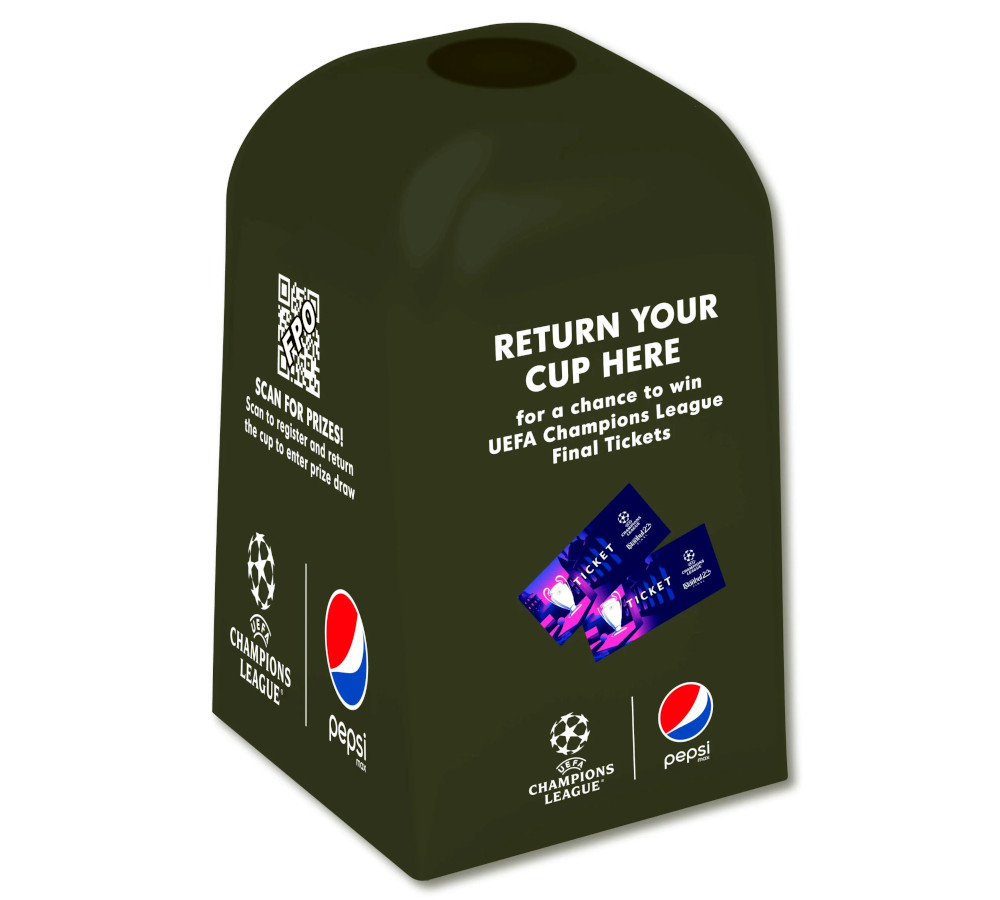Last weekend’s Women’s event was the first Champions League Final to deploy returnable service ware, starting a long-term collaboration in reducing waste at major sports events.
The Union of European Football Associations’ (UEFA)
Men’s and
Women’s Champions League
Finals — the two biggest sporting events in Europe — are quickly representing
two of the top five in the world based on the growth of the women’s game.
The men’s event is routinely one of the most-viewed matches in the world,
regularly doubling Super Bowl
viewership,
and is really only surpassed in men’s World Cup years.
Like any other large sports gathering, these events also produce a ton of
waste
— primarily single-use
plastic
— but this year’s editions point to a potential new path forward through a
partnership between PepsiCo and the UEFA.
Last weekend’s Women's Champions League Final in Eindhoven, Netherlands was
the first to pilot a returnable packaging program — where 52,000, 40-centiliter
transparent cups were available to purchase for a returnable deposit of €2.
Along with the cups, Doritos Nachos were served in returnable trays
throughout the stadium.
The role of art in climate, sustainability and regeneration discourse
Benjamin Von Wong’s activist artistry transcends mere visual appeal — underlining the essential role of art in climate, sustainability and regeneration discourse. Join us as he explores the incredible potential of art as cultural commentary in raising awareness, and taking our shared behavioral and cultural pursuits to the next level — Wed, May 8, at Brand-Led Culture Change.
 Image credit: PepsiCo
Image credit: PepsiCo
“(While) we are waiting for the data from Eindhoven stadium post-event, key
success metrics for (these) cups and food trays will obviously be the redemption
rate, which we trust will be > 90 percent,” PepsiCo Europe chief sustainability
officer Archana Jagannathan
told Sustainable Brands®.
Mark Kirkham, PepsiCo SVP and
chief marketing officer for global beverages, adds that the company considered
deep consumer insights around recycling habits, cultural intel and understanding
of local waste-management processes and infrastructure to make it a seamless
experience.
“It was ultimately a pilot to test and learn for the future; and we look forward
to analyzing and learning from the results once they are captured,” he says.
This Saturday’s men’s Final is in Istanbul — where PepsiCo is partnering
with smart reuse service TURN to deploy 48,000 TURN smart
cups, which are scanned at the collection point and can be sanitized and reused
through the company’s larger second-use system. Further, both events will
feature 100 percent recyclable packaging for all PepsiCo food and beverage
products.
Supporting bigger change down the road
Kirkham notes that last year, PepsiCo helped UEFA outline its Circular Economy
Strategy within its broader Football Sustainability Strategy
2030,
as the association begins a broader journey towards zero plastic and food waste
at its events.
While the data from the endeavors at this year’s Finals will certainly be
analyzed at great depth, realizing that kind of goal will likely be tough as
UEFA represents 55 European countries, all with different recycling and
processing infrastructures and all at a different point in their own
responsibility journeys.
“Our actions are focused on finding and disseminating solutions applicable to
football matches taking place across national associations, leagues and clubs in
Europe to play our part in tackling environmental challenges," Michele
Uva, UEFA social and
environmental sustainability director said in a press release.
UEFA has a range of 2030 benchmarks it’s working to meet — including the rollout
of its own “sustainable event management system,” which could be aspirational;
but interestingly, Kirkham adds that PepsiCo would like to see zero waste to
landfill become a requirement included in future hosting rights for all UEFA
events — which could spur faster adoption of system-wide sustainability
measures.
The first step is realizing a collective goal to make both Champions League
Finals “zero waste to landfill” by 2026. Sustainable Brands was not able to get
an update on progress towards this goal by press time.
For now, it’s clear that the data collected from both events will be among the
most valuable outcomes from these two major events.
Jagannathan explained that additional fiber cups circulated throughout the Final
in Istanbul will be 100 percent recyclable in the local paper stream; and the
material has a higher value in the current commodity market (which is important
to the responsible movement and re-integration of the material).
“We were assured about the waste flow, which is arranged properly to maximize
recycling rate of cups from the stadium,” she says. “Reuse efforts are fairly
easy to manage, as we track measuring total cups sold vs. redeemed.”
She acknowledged that they may not get as much detail in the data as they’d
like, solely because of the scale of collecting this amount of recyclable
material from 60,000 fans with 220 collection bins spread through the stadium,
fan zone and festival zone.
But the PepsiCo-UEFA pilots join similar efforts from
Anheuser-Busch,
Ball
Corporation
and Liverpool
FC
to engage sports fans on circularity and the importance of recycling and reuse;
and represent positive momentum toward reining in the environmental impact of
events.
Published Jun 9, 2023 2pm EDT / 11am PDT / 7pm BST / 8pm CEST
Geoff is a freelance journalist and copywriter focused on making the world a better place through compelling copy. He covers everything from apparel to travel while helping brands worldwide craft their messaging. In addition to Sustainable Brands, he's currently a contributor at Penta, AskMen.com, Field Mag and many others. You can check out more of his work at geoffnudelman.com.